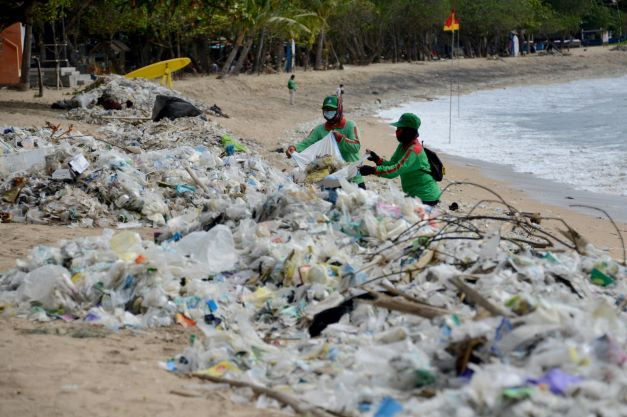Popular Reads
Top Results
Can't find what you're looking for?
View all search resultsPopular Reads
Top Results
Can't find what you're looking for?
View all search resultsUnpacking recycling behaviors at the root of lasting solutions
Standard warnings highlighting the environmental impact of plastic waste were ineffective in engaging communities in Bali.
Change text size
Gift Premium Articles
to Anyone
E
nvironmental sustainability has been top-of-mind in recent years, especially in the aftermath of the COVID-19 pandemic, as we witnessed the (almost immediate) positive effects brought about by a reduction in travel and activity. In parallel, considerable pressure has mounted on corporations – not only to operate in a sustainable manner, but to go above and beyond what is required of them with their environmental actions.
In the same vein, consumers are showing greater awareness of their environmental footprint and increasingly say they prefer brands that embrace sustainability. A global study by Deloitte revealed that close to a quarter of respondents will switch to buying products from an organization that shares their values on environmental issues. However, a frustrating paradox is hampering progress. Despite growing positive attitudes, few consumers are following through with their actions. An obvious case in point is the stagnation of recycling rates.
About 80 percent of post-consumer waste should, technically, be able to be recycled; however, global figures have languished at around 9 percent. Southeast Asia, in particular, continues to suffer from low recycling rates despite the rapid growth of consumption. In Indonesia, only 10 percent of the total 6.8 million tons of plastic waste generated is recycled.
While poor waste management infrastructure is one of the leading contributors to the problem, especially in developing markets, inadequate and lackluster recycling practices must also shoulder some of the blame.
If we take the example of Singapore, a country with an established recycling infrastructure, recent figures released by the National Environment Agency found that around 40 percent of contents found in recycling bins cannot be recycled owing to leakage from food and liquid waste, as well as e-waste and styrofoam. Despite public awareness campaigns, misconceptions remain about what can and cannot be recycled.
These behaviors must change and do so rapidly if we are to prevent plastic leakage into the ocean in a sustainable way. As investment into improving recycling infrastructure and processes grows, the same, if not more effort must be directed to narrowing consumers’ intention-action gap and facilitating positive behavioral change.
Behavior change, as any psychologist will attest, is highly challenging. Adopting new habits requires individuals to embrace unfamiliarity and disrupt ingrained patterns of thinking. However, new research has revealed that appeals to emotional motivations, coupled with personal engagement, can have a catalyzing and enduring impact when it comes to getting people to change their recycling habits.
These interventions are particularly effective in the first two stages of the behavior change journey- awareness and ability - where barriers include a lack of knowledge of existing recycling programs and the ingrained belief that recycling is too tedious. To overcome these obstacles, first and foremost, more thought must be put into uncovering why individuals in each community would be motivated to recycle and tailor campaigns to speak to this unique context.
For instance, in our analysis of local recycling projects, we found that standard warnings highlighting the environmental impact of plastic waste were ineffective in engaging communities in Bali. Residents on this tourist-destination island had been inundated with messaging about plastic pollution and were desensitized to the issue.
On the flip side, messaging that was aligned to Bali’s tight-knit, hierarchical culture was more effective. Informational letters carrying stamps from two important authorities – the official local government and religious adat (customary law community), helped to build trust and achieve greater community engagement and more consistent recycling behaviors. While some basic, tried-and-true elements can be universally applied to different programs, identifying and tailoring to differentiating lifestyles and values is needed to tip the scales.
In delivering these tailored messages, mass communication campaigns will continue to play a critical role in raising awareness and providing legitimacy to recycling programs. These campaigns lay the foundations, but alone they are not sufficient to create real change.
To drive home the message and push consumers to act, personalized bottom-up interactions are also needed. Put simply, people must feel that these outreach programs are supporting them to make the change and without much hassle. For example, through follow-ups on progress or regular opportunities to ask questions and have them answered.
In the Argentinian community of Barrio Mugica, waste collection workers, who all lived in the neighborhood, also played the role of door-to-door educators and gradually built strong relationships with residents. An added benefit is that these consistent connections can also create a sense of social expectation to recycle.
Shifting to a circular economy across Asia is essential to addressing the region’s plastic waste crisis. Consensus on a first-of-its-kind global plastics agreement reached earlier this year will only accelerate the growth of a sector that is already seeing significant investment.
While excitement is often focused on the innovative technologies and materials that are transforming global plastic supply chains, it is crucial to remember the role of individuals and households in enabling large-scale societal transformation. We will only see success if investment into improving the system is supported by a commitment – from governments, investors and corporations – to shift individual practices.
Behavior change is not a “nice to have”, it is integral to making the economics of recycling work, and it does not have to come at a loss. In fact, our earlier joint study revealed that investment in recycling behavior across emerging economies can have a quantifiable ROI and presents a major – and often missed – opportunity to boost success rates of sustainability initiatives.
There are endless opportunities to develop creative campaigns and clever apps to encourage consumer recycling, but sometimes the simplest approach – like a conversation – is the most effective. Our timeline on addressing plastic pollution and climate change is getting tighter by the day and equipped with knowledge and real-life evidence of the interventions that work best, all ecosystem players, including us as individuals, need to make a concerted effort to ensure they are leveraged to drive long-term change.
***
Ellen Martin is director of impact and insights, The Circulate Initiative. Jeremy Douglas is director of partnership, Delterra











